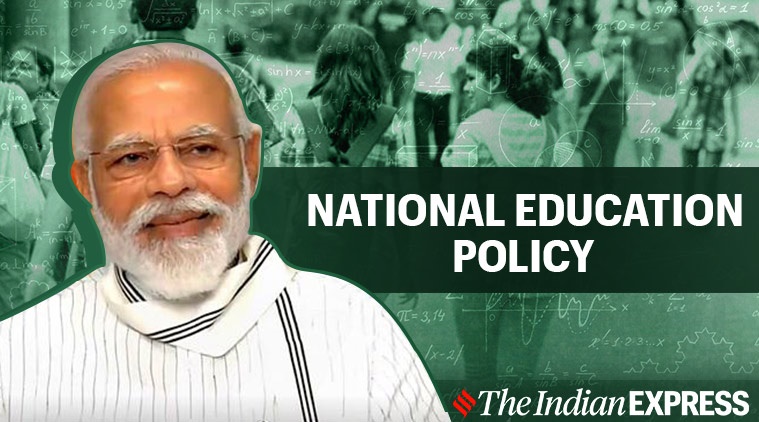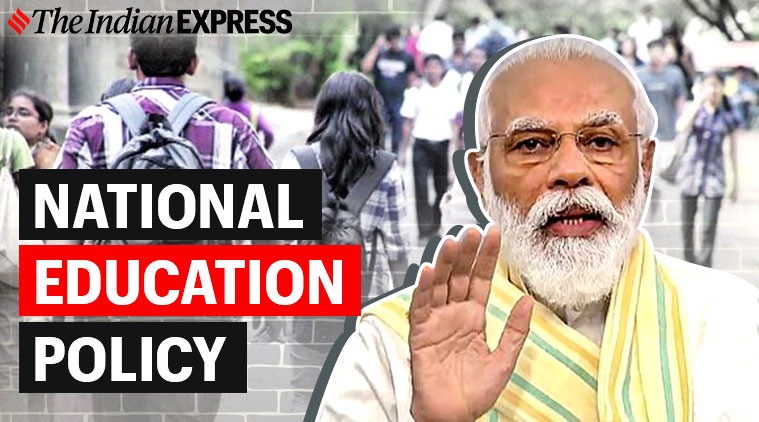 PM Narendra Modi address will begin at 11 am. Graphics: Designed by Gargi Singh
PM Narendra Modi address will begin at 11 am. Graphics: Designed by Gargi Singh
PM Narendra Modi Speech Today on New Education Policy 2020 LIVE Updates: Addressing a conclave on ‘Transformational Reforms in Higher Education under National Education Policy’, Prime Minister Narendra Modi Friday said the new National Education Policy (NEP) will be the foundation of the new India. At the conclave aimed to discuss several new initiatives introduced under the recently launched NEP, the prime minister asked all stakeholders to discuss the ways to implement the new policy.
PM Modi said that through NEP, India will transform its students into global citizens who are rooted in their values. “In recent years, there have not been major changes in education and thus the values of curiosity and imagination were not given the thrust. Instead, we moved towards a herd community. The mapping of interest, ability, and demand was needed. We need to develop critical thinking and innovative thinking abilities in our youths. It will be possible if we have purpose, philosophy, and passion of education,” he added.
PM Narendra Modi Speech Live | Check update in Hindi
The conclave is also attended by Union education minister Ramesh Pokhriyal Nishank and Krishnaswamy Kasturirangan, former ISRO chief, who also headed the committee which drafted the NEP, and vice-chancellors of several universities. The new policy proposed sweeping changes in school and higher education.
 PM Narendra Modi address will begin at 11 am. Graphics: Designed by Gargi Singh
PM Narendra Modi address will begin at 11 am. Graphics: Designed by Gargi Singh
We are also trying to ensure that the talent of India stays in India and works for the development of generations to come, said PM. NEP allows top ranking institutes of the world to set-up campuses in India. Earlier, the HRD Ministry (now Education Ministry) had introduced several initiatives under Study in India program, says Modi
India is split on the topic of autonomy. One school of thought says that the government should have the say in the education institutes while the other believes every institute should have freedom. The way to quality-education goes from between both these schools of thought. The institutes which will work more on quality education will be given more freedom as a reward. This will increase the quality and encourage higher education institutes to grow, says PM.
With changing time, a new global system has risen. Thus, it was essential for India to change its education system accordingly. Creating a 5+3+3+4 curriculum, and replacing the 10+2 structure was a step in this direction, says PM
The NEP focuses on teacher training. I believe, when a teacher learns, the national leads, says PM Modi.
Often students find that what they have learned is not in line with their job. Thus, to give flexibility to students we have given multiple entries and exit points. We have also freed education from the stream system. Students will have the flexibility to change their course if they do not think it is right for them. We are moving from thinking when a person is not glued to one profession for the entire lifetime and hence s/he needs to skill, re-skill and upskill. These issues are part of NEP, says PM.
Till now, we have focussed on what to think but NEP 2020 focuses on how to think. In the time when there is a flood of information and content. It is important that we know which information is necessary and which is not. We need inquiry-based, discovery-based, and analysis-based modes of teaching. This will increase the interest to learn and participate in class, says Modi.
We need to make our students into global citizens and yet be rooted in their culture. The learning power of students will improve if the language they speak in and the language in which lessons are taught in school is the same. That is why we have recommended teaching in the mother tongue as far as possible - at least class 5. This will strengthen their foundation, says PM
In the recent years, there have not been major changes in education and thus the values of curiosity and imagination were not given the thrust. Instead, we moved towards a herd community. The mapping of interest, ability, and demand was needed. We need to develop critical thinking and innovative thinking abilities in our youths. It will be possible if we have purpose, philosophy, and passion of education, says PM
The New Education Policy is the foundation of the New India, the India of 21st century. It will give your youth the education and skillset they need. The NEP has given special focus on the areas to ensure India is a superpower and is at the new heights of development and provide the people of India with new and best opportunities, says Modi.
NEP has given rise to a healthy debate and the more we discuss and debate the more it will benefit the education department. It is palpable that questions will arise on how this huge plan will be implemented. We all will together do this implementation. Each one of you is directly involved in implementation of the NEP. In terms of political will, I am totally committed and with you, says Modi.
Minister of Education Ramesh Pokhriyal Nishank welcomes Prime Minister Narendra Modi to the conclave on the new National Education Policy. Kasturiranjan - the former ISRO chief who led the committee which drafted the new National Education Policy also present at the conclave. The entire conclave is being held digitally.
While delivering an address on Smart India Hackathon, PM Modi had said, “India’s National Education Policy reflects the spirit of new India. We are shifting from the burden of the school bag, which does not last beyond school. To the boon of learning which helps for life. From simply memorizing to critical thinking. The 21st century is the era of knowledge, learning, and innovation.”
While Modi will be talking higher education institutes he is likely to mention key decisions under NEP including - the scrapping of MPhil, setting up of a body to replace NAAC, AICTE, UGC; multiple entry and exit points in the higher education system, etc.
The class 10 and 12 exams — referred to as board exams — are likely to be held in two difficulty levels and students will be given a second chance at boards to improve their score. They will be free to take up courses regardless of the stream division of arts, commerce and science.
A system of annual or semester or modular board exams could be developed to test far less material, and taken immediately after the corresponding course is taught in school so the pressure from exams is better distributed and less intense.
Talking about NEP earlier, PM Narendra Modi said, “The NEP is not just a policy but is a compilation of aspirations of all 130 crore Indians. It took five years to discuss and debate each aspect and then the new education policy (NEP) was released. This policy, in the true sense, has all the aspirations of all the Indians.”
A committee of experts headed by former ISRO chief K Kasturirangan drafted NEP. Based on draft NEP, suggestions were sought from the public. MHRD received over 2.5 lakh suggestions on it. After discussion, NEP was brought into place.
The 10+2 system will be divided into 5+3+3+4 format. The NEPchanges the school education system to 5+3+3+4 format. This means the first five years of the school will comprise of the foundation stage including three years of pre-primary school and classes 1 and class 2. The next three years will be divided into a preparatory stage from classes 3 to 5. Later three years of middle stage (classes 6 to 8), and four years of secondary stage (classes 9 to 12). Schools will not have any rigid formation of streams of arts, commerce, science, students can take up whichever courses they want.